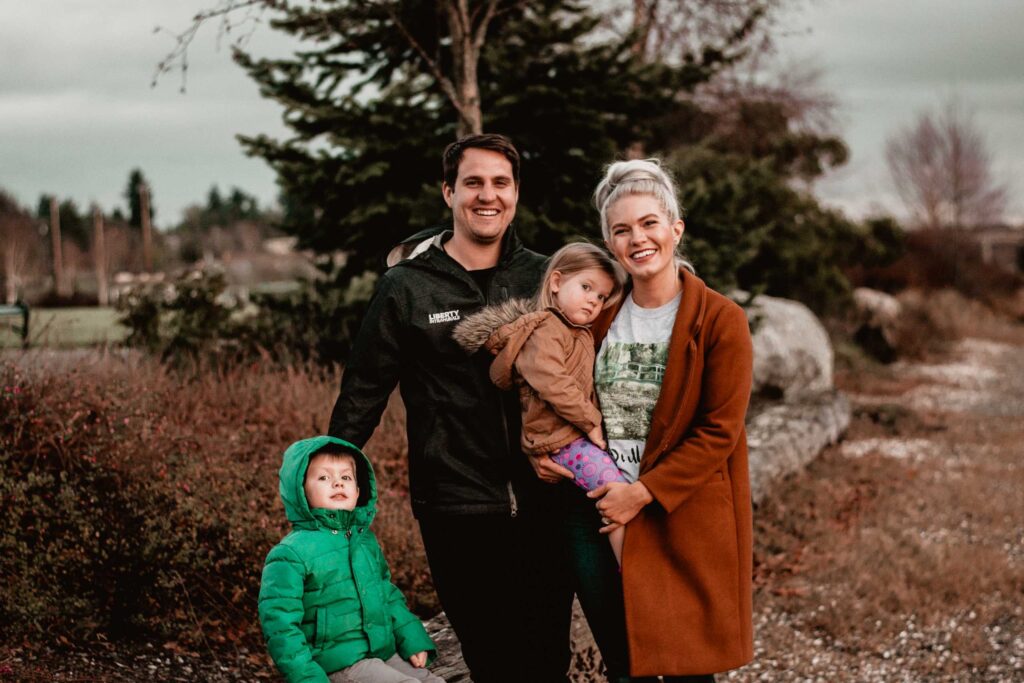
How to pinch pennies and save for big goals.
First, the stats. In August 2017, Josh and I and our two kiddos moved in with his parents. At that time I had about $50,000 in student loans, $0 credit card debt, and $0 car payments (we sold our car just before we moved) but we also had maybe $1000 in savings? I honestly don’t remember. Since that time, we’ve been able to pay off about $30,000 in student loans, save up about $20,000 for a down payment on a home, not to mention pay a whopping $5,000 *unexpected* medical bill. Oh, and fly across the country for like 4 weddings.
Now, let me start with a little background. As I mentioned, about two and a half years ago, Josh and I moved in with his parents so we could start saving up to buy a home of our own here in Washington. Our goal at the time wasn’t even to start paying off the $50,000~ we (ok, I) had in student loans at the time.
First things first
We very quickly realized that that’s where we should start. So we pushed back our original timeline of when we would move out (something we would do several more times throughout the process) and started throwing whatever extra money we had each month towards my loans with the highest interest rates.
Now, it took us about 6 months to even start paying extra money towards my loans because up until that point, our family had been surviving on my small blogging income (which is doable when you’re living in your parents house). Six months after we moved in, however, I started working remotely for a tech startup in NY. This is when we were finally able to start making some headway.
Here are a few tips and practices we used along the way that made paying off our debt more of a habit than a burden:
Don’t have a credit card… or at least pretend you don’t
Sure, this is easier said than done, but it is doable and so extremely important. If you do have credit card debt, I’d suggest working towards paying that off first. Dave Ramsey, whose principals we loosely followed, would tell you to make a list of all your individual loans and debts and work towards paying off the smallest debt first, then the next smallest, and so on. If that’s your credit card, then start there. If it’s a student loan, then start there (some of my student loans had 10% and 11% interest rates!!!!).
Staying away from credit card debt comes down to really only paying what you can afford at the time you want to buy. Josh and I *kind of* lived by this principal. We made most of our purchases with a travel rewards credit card so we could earn miles with our favorite airline, but we treated it light a debit card in that we paid it off very quickly. It was also the first thing we paid off every paycheck. We never wanted to be tricked by the illusion of having money when really it was owed to someone else.
I always felt so much satisfaction whenever I saw that credit card balance drop back to 0 and almost in a way felt competitive about it. When I saw the balance start to wrack up, I felt stressed and annoyed that we let that happen.
Morale of the story, pay for what you can afford. Things won’t make you happier. If you feel like you really want something in the moment, wait a day or two to buy it and see if you feel the same later. You may save yourself from making unnecessary purchases in the moment.
Make sacrifices
I touched on a rather obvious point in the beginning of this post and that’s the fact that we – a family of four with our youngest only being three months at the time – moved in with Josh’s parents. And we’ve been here for about 2.5 years. Whenever someone tells us “Wow you guys are going to be in great shape when it comes time to buy a house!” I say with a huge smile, “We better be after living with our parents for this long!.”
Seriously though, saving up enough money to pay off loans and save for a down payment doesn’t come without sacrifices. It means finding the most affordable living conditions possible. It means working more. Making food and coffee at home. Finding the cheaper gym membership and potentially homeschooling or sending your kids to public school.
It also very much means saying a big fat NO to lots of purchases, trips, services, what have you. Josh and I spent the last couple years driving a very dinky hand-me-down car with hawaiian print seats. At times, it was embarrassing to drive. Could we have afforded to buy a car? For sure. But we had a car (dinky as it was) that was free, got us to where we needed to go, and allowed us to put even more $$ towards debt and savings each month.
Society will make you feel as though certain things are needs. Like a new phone, nice jeans, a new car, a big living space. The reality is, nobody needs those things, and they all come at a cost. It’s not that those things are bad, but they’re never needs and they won’t make you any happier on their own.
Making sacrifices is hard and, trust me, it does get frustrating saying no all the time. But it’s extremely worth it in the long run.
Create a budget
Josh and I rarely ever do anything by the rules. I believe that when people want to save money, they need to really understand how much they can trust themselves. Really.
I used a Everydollar to keep track of money coming in and out each month. It’s so easy to loose track of how much you spend in a certain category like eating out, coffee shops, clothes, cosmetics, etc. Everydollar, while retroactive, always made me realize when I spent more than I should and because of that knowledge, I would tighten up the reigns next month.
Now, you may be the type of person who needs to withdraw Xamount of cash for eating out each month and when that cash is gone, no more eating out and if you don’t you’ll undoubtedly spend more than you should. Like I said, the key is knowing yourself. If you’re the type who’ll take a mile if you give yourself an inch, then you’re going to need to be strict to reach your goals. If you’re pumped about saving every penny you can, then you might not need to be so strict.
In any case, it’s important to keep track of exactly where your money is going each month and there are a lot of tools that are great for doing that. Everydollar is my favorite because I find it extremely user friendly and in 2020, I have no patience for SaaS products that aren’t. You choose what works best for you.
Work more
Now, depending on how fast you’d like to get out of your current situation, you may or may not be motivated to work extra hours to reach your goal faster. The logic is simple. Work more = earn more $$ = pay off/save more. So that’s what I did. On top of earning an income with blogging and Instagram, I used those very same skills to get a full time job.
That in and of itself was a big sacrifice. I would have loved to use all my creative energy towards my own blog, but in reality that just wasn’t going to cut it if we wanted to move into our own home as soon as I wanted. And I really wanted that. In the end, I actually ended up loving my job, my coworkers, and I learned a lot of new skills that could help me in my side job as well. So it’d say it was well worth it.
So whether you or your spouse take on extra work in order to throw most or all of that extra income towards paying off debt, again, it’s going to be hard but worth it!
All extra money makes a b-line to your debt
As you can imagine, it would feel pretty good anytime we saw some money in the bank even after all credit cards and bills were paid. But even if we did have extra money in the bank after that, it went straight towards our debt. Josh and I didn’t even consider it to be our money. I usually left a small cushion in our bank account if I could, and then paid as much as I could towards the principal of the loan with the highest interest rate.
If extra money came in for birthdays, Christmas, side jobs – whatever – it went towards my loans. One year, we got about $7,000 from a tax return. Guess where 100% of it went? My student loans. Once we paid off all of my private student loans (about half our debt was Sallie Mae loans with insane interest rates and half were federal loans with much more reasonable rates) we shifted our focus towards saving up for a down payment. Even then, almost all extra money each paycheck went into a savings account where withdrawals and transfers were FORBIDDEN.
In conclusion,
Be obsessed with your goals. And enjoy the process in the meantime.
I’ll be the first to say that I haven’t always been patient throughout our journey of paying off debt and saving. There were so many days when I wanted to jump ship and take out a loan for whatever house I could afford at the time and get in my own place as soon as possible (working from home while living in a very full house is no joke). But again and again Josh reminded me that we were working towards something better. Better for us and better for our kids. And I’m so glad I reluctantly listened to him.
Also take time to celebrate your wins. Like I said earlier, working towards paying off debt takes a lot of sacrifices and you’ll burn out if you never celebrate the progress you’re making. So, when you pay off a big debt, go out for dinner, celebrate with your family, enjoy the “meantime” knowing that you’re creating a radically different future for yourselves!





Congrats on such a huge accomplishment!! My husband and I are doing something very similar. Our baby is about to turn 4 months old and we are staying with my parents to be able to pay off debt and save some money for our own home. Our original plan was to get out of here quick and just rent if needed, but buying is what we would so much rather do. With us working from home and my siblings going to school from home it has been hectic. And it is hard to admit you’re living with your parents when you have your own family that is growing. But when we stay focused on the positives and the beauty of the extra time with our loved ones it is so much easier to enjoy the journey. Thank you for sharing and being transparent! God bless y’all!